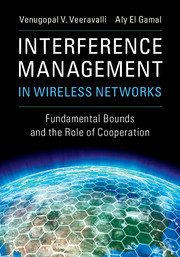Book contents
- Frontmatter
- Contents
- Preface
- Acknowledgments
- 1 Introduction to Interference Management
- 2 System Model and Sum Capacity Characterization
- 3 Degrees of Freedom and Interference Alignment
- 4 Iterative Algorithms for Interference Management
- 5 Degrees of Freedom with Coordinated Multi-Point Transmission
- 6 Locally Connected Channels with CoMP
- 7 Backhaul Load Constraint
- 8 Cellular Uplink
- 9 Dynamic Interference Management
- 10 Recent Advances and Open Problems
- Appendix A Information Theory
- Appendix B Algebraic Geometry
- References
- Index
10 - Recent Advances and Open Problems
Published online by Cambridge University Press: 09 February 2018
- Frontmatter
- Contents
- Preface
- Acknowledgments
- 1 Introduction to Interference Management
- 2 System Model and Sum Capacity Characterization
- 3 Degrees of Freedom and Interference Alignment
- 4 Iterative Algorithms for Interference Management
- 5 Degrees of Freedom with Coordinated Multi-Point Transmission
- 6 Locally Connected Channels with CoMP
- 7 Backhaul Load Constraint
- 8 Cellular Uplink
- 9 Dynamic Interference Management
- 10 Recent Advances and Open Problems
- Appendix A Information Theory
- Appendix B Algebraic Geometry
- References
- Index
Summary
Over the years since Claude Shannon [12] introduced the subject, information theory has proven to be a powerful mathematical tool that is also practically relevant in terms of guiding the design of transmitters and receivers for communication systems and networks. From the analysis of the capacity of point-to-point communication links [12] to the more advanced analysis of network information theory [99], there is evidence that information-theoretic tools not only provide performance benchmarks but also inspire new designs for coding schemes and communication protocols. In this book, our focus has been on information-theoretic tools that are geared toward laying a framework for interference management in modern wireless networks. We started with a discussion of the information-theoretic capacity of the two-user interference channel in Chapter 2, which is a long-standing open problem. We do not yet understand how interfering signals should be handled by the decoders at the receivers except in special cases: (i) where the interference power is high and the interfering signal(s) can be decoded, and (ii) and where the interference power is low and the interfering signal(s) can be treated as noise. We then considered the degrees of freedom criterion in the rest of the book, due to its attractive simplicity and utility in providing insights for interference management. We considered general K-user interference channels in Chapter 3, and introduced the concept of asymptotic interference alignment. We then studied in Chapters 5–9 the potential gains of cooperative communication through the lens of DoF analysis in large interference networks. In these studies we assumed a centralized controller, one that has a global view of the network and can make decisions on cell associations and transmission schedules for the whole network, with the goal of maximizing the sum DoF. It is important to note that our study of models with centralized controllers does not imply that we are advocating a centralized approach in next-generation wireless networks over a distributed one that only requires local network knowledge for making decisions. Analyzing fundamental bounds on the performance for the centralized solution can also lead to good design choices for distributed schemes, as well as providing benchmarks for their performance, as we have seen in our study of distributed interference management algorithms in Chapter 4 and Section 5.7.
- Type
- Chapter
- Information
- Interference Management in Wireless NetworksFundamental Bounds and the Role of Cooperation, pp. 183 - 192Publisher: Cambridge University PressPrint publication year: 2018



